Tourism in New York City
New York City received a ninth consecutive annual record of approximately 65.2 million tourists in 2018, the busiest tourist city attraction, and one of the world’s overall busiest tourist attractions,[1] counting not just overnight visitors but anyone visiting for the day from over 50 miles away, including commuters. Overall the city welcomed 37.9 million visitors who stayed overnight in 2018, of whom 13.6 million were international.[3] Major destinations include the Empire State Building, Ellis Island, the Statue of Liberty on Liberty Island, Broadway theatre productions, Central Park, Times Square, Coney Island, the Financial District, museums, and sports stadiums. Other major visitor activities include luxury shopping along Fifth and Madison Avenues; entertainment events such as the Tribeca Film Festival; Randalls Island music festivals such as Governors Ball, Panorama and Electric Zoo; and free performances in Central Park at Summerstage and Delacorte Theater. Many New York City ethnic enclaves, such as Jackson Heights, Flushing, and Brighton Beach are major shopping destinations for first and second generation Americans.
.jpg.webp)
New York City has over 28,000 acres (110 km2) of parkland and 14 linear miles (22 km) of public beaches.[4][5] Manhattan's Central Park, designed by Frederick Law Olmsted and Calvert Vaux, is the most visited city park in the United States.[6] Prospect Park in Brooklyn, also designed by Olmsted and Vaux, has a 90-acre (36 ha) meadow.[7] Flushing Meadows–Corona Park in Queens, the city's fourth-largest, was the setting for the 1939 World's Fair and 1964 World's Fair.
Industry
| Year | Total visitors (millions) |
Domestic visitors |
International visitors |
Total visitor spending billions (US$) |
|---|---|---|---|---|
| 1991 | 29.1 | 23.6 | 5.5 | 10.1 |
| 1995 | 28.5 | 23.1 | 5.4 | 11.7 |
| 1998 | 33.1 | 27.1 | 6.0 | 14.7 |
| 1999 | 36.4 | 29.8 | 6.6 | 15.6 |
| 2000 | 36.2 | 29.4 | 6.8 | 17.0 |
| 2001 | 35.2 | 29.5 | 5.7 | 15.1 |
| 2002 | 35.3 | 30.2 | 5.1 | 14.1 |
| 2003 | 37.8 | 33.0 | 4.8 | 18.5 |
| 2004 | 39.9 | 33.8 | 6.2 | 21.3 |
| 2005 | 42.6 | 35.8 | 6.8 | 24.3 |
| 2006 | 43.8 | 36.5 | 7.3 | 26.2 |
| 2007 | 46.0 | 37.1 | 8.8 | 30.0 |
| 2008 | 47.1 | 37.6 | 9.5 | 32.0 |
| 2009 | 45.8 | 37.0 | 8.8 | 28.2 |
| 2010 | 48.8 | 39.1 | 9.7 | 31.5 |
| 2011 | 50.9 | 40.3 | 10.3 | 34.5 |
| 2012 | 51.5 | 40.9 | 10.6 | 36.9 |
| 2013 | 53 | 41.7 | 11.3 | 38.8 |
| 2014 | 54.4 | 42.5 | 11.9 | 41.2 |
| 2015 | 55.9 | 43.2 | 12.7 | 42.3 |
| 2016 | 60.5 | 47.8 | 12.7 | 43.0 |
| 2017 | 62.8 | 49.7 | 13.1 | 44.2 |
| 2018 | 65.2 | 51.6 | 13.5 | 44.0 |
| 2019[8] | 66.6 | 53.1 | 13.5 | 47.4 |
| 2020[8] | 22.3 | 19.9 | 2.4 | 12.8 |
| 2021[8] | 32.9 | 30.2 | 2.7 |
According to NYC & Company, the official destination marketing organization for the city, the top producing countries for international visitors to New York City in 2011 were the United Kingdom (1,055,000), Canada (1,033,000), Brazil (718,000), France (662,000), Germany (587,000), Australia (532,000), Italy (495,000), China (427,000), Spain (422,000), Mexico (376,000), and Japan (299,000).[9] With the exception of slight peaks around Thanksgiving, Christmas and New Year, visitor arrival rates are roughly the same year-round. New York has one of the highest hotel-occupancy rates in the country. Arrivals have remained relatively high even since the global economic crisis. The city lost a third of its hotel rooms during the COVID-19 pandemic, while room revenue was down more than $150 a room in the remaining ones. The dip was enough for the American Hotel and Lodging Association to put it in the "depression" category. Only San Francisco, Boston and Washington, D.C. fared worse.[10]
In 2017, there were an estimated 62.8 million visitors to the city, including daytrippers, of which 49.7 million were domestic.[11]
Double-decker tour buses and boats with tour guides bring sightseers to various parts of Manhattan and other boroughs having a robust infrastructure also in the charter bus industry with thousands of companies providing chartered transportation services for groups visiting the city the most known ones are Academy, Bus Charters VIP, Leprechaun, Peter Pan, Megabus, while pedicabs and horse cabs serve those with a taste for more personal service. More adventurous tourists rent bicycles at neighborhood shops or along the Manhattan Waterfront Greenway or simply walk, which is often the quickest way to get around in congested, busy commercial districts and a way to appreciate street life.
Many visitors investigate their genealogy at historic immigration sites such as Ellis Island and the Statue of Liberty. Other tourist destinations include the Empire State Building, for 41 years the world's tallest building after its construction in 1931, Radio City Music Hall, home of The Rockettes, a variety of Broadway shows, the Intrepid Sea-Air-Space Museum, housed on a World War II aircraft carrier, and city landmarks such as Central Park, one of the finest examples of landscape architecture in the world. New York City has encouraged tourist shopping by eliminating its sales tax on clothing and footwear. In the past, the World Trade Center was an important tourist destination before the September 11 attacks, which devastated the city and its tourist industry. Tourists were scarce for months, and it took two years for the numbers to fully rebound with fewer international, but more domestic visitors, due in part to an emphasis on "patriotic tourism".[12] The World Trade Center site itself became an important place to visit, and visits to the World Trade Center have increased, especially with openings of new buildings on the site in recent years.
Street fairs and street events such as the Labor Day Carnival in Brooklyn, Halloween Parade in Greenwich Village, and New York Marathon also attract tourists.
_by_David_Shankbone.jpg.webp)
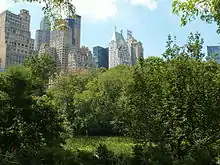
 Tour guide lecturing in Italian at Morris-Jumel Mansion
Tour guide lecturing in Italian at Morris-Jumel Mansion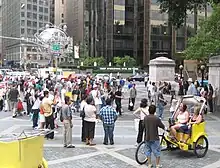 Tourists gather around a busker in Columbus Circle.
Tourists gather around a busker in Columbus Circle.
Tourism companies
New York City law requires all guides to be licensed by the Department of Consumer Affairs. A professional trade organization of licensed tour guides in the city is GANYC (Guides Association of New York City), which represents just 10.9% of all licensed tour guides in the city.[13] Potential licensees must pay a fee and take a compulsory 150-question examination about New York City topics, of which they must get at least 97 questions correct.[14][15][16] As of 2018, over 3,000 guides have certification.[16]
In 1992, the "Greeter" initiative was founded by Lynn Brooks with the association "Big Apple Greeter" in New York City.[17] The voluntary and personal hosting of tourists should improve the bad image of the megacity. More "Greeter" projects followed in other United States cities and worldwide. More than 300 volunteers "greet" over 7,000 visitors per year in New York City as of 2010.[18]
NYC & Company, the city's official convention and visitor bureau, is currently headed by Fred Dixon. It has offices in 14 countries, including Brazil, Britain, France, Germany, Ireland, Italy, Mexico, The Netherlands, Russia, Spain, Sweden, Japan, Korea and China.[19] NYC & Company is the official source of tourism statistics for the city. The research department develops and distributes comprehensive information on NYC domestic and international visitor statistics and monitors the travel industry's impact on New York City's economy. The department also produces 14 official New York City tourism marketing publications that feature information on member hotels, museums, attractions, theaters, stores, restaurants, meeting venues, and service providers.
Special interest tours
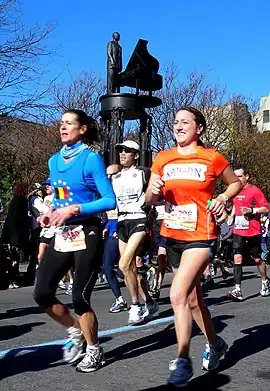
New York City has a rich musical culture and history.[20] Accordingly, numerous jazz, gospel music, rock and roll, rhythm and blues and hip hop tours are available. Popular locations for music tours include Harlem and the East Village, which is home to several historical sites related to the birth of punk music.[21] Walking tours are one of the most popular ways of seeing the city and many private guides supply tours. Companies producing audio walking tours include the Gesso app.[22]
Food tours are another option for visitors. New York is one of the top culinary destinations in the world. New York's food culture, influenced by the city's immigrants and large number of dining patrons, is diverse. Jewish and Italian immigrants made the city famous for bagels, cheesecake and New York-style pizza. Some 4,000 mobile food vendors, many of them immigrants, are licensed by the city and have made Middle Eastern foods such as falafel and kebabs standbys of contemporary New York street food.[23] The city is also home to many of the finest haute cuisine restaurants in the United States.[24] Food tours allow visitors to try a wide variety of these foods economically and learn about the city's culture.[25] Tour companies include New York Food Tours, Local Finds Queens Food Tours and Rum and Blackbird Tasting Tours.[26]
Visitors to New York City also partake in sports tourism. Sporting events draw tourists to major venues such as the Yankee Stadium, Citi Field, and Madison Square Garden, and to street events such as the New York City Marathon.
Most visited attractions
All of the below attractions are located in Manhattan unless otherwise stated. Only attractions with more than 2 million visitors are listed. The most visited attractions in New York City include:
| Name | Image | Location | Estimated number of visitors (millions) | As of | Ref. |
|---|---|---|---|---|---|
| Central Park |  |
between 5th and 8th Aves, between W 59th and W 110th Sts | 42.0 | 2016 | [27] |
| Times Square | 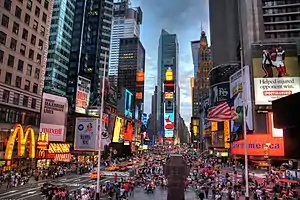 |
Broadway and 7th Avenue between W 42nd and W 47th Sts | 39.5 | 2014 | [28] |
| Grand Central Terminal | 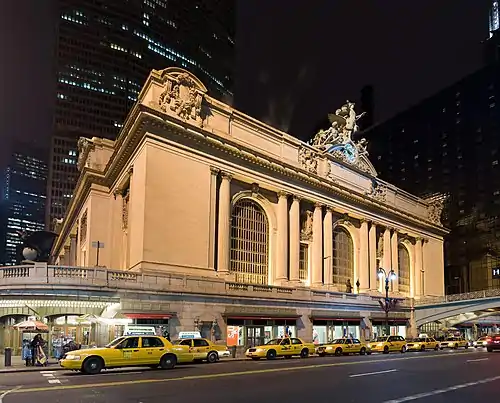 |
Park Ave between E 42nd and E 45th Sts | 21.6 | 2014 | [28] |
| Theater District (including Broadway theatres) |  |
between 6th and 8th Aves, between 40th and 54th Sts | 13.0 | 2018 | [29] |
| Rockefeller Center (including Top of the Rock) |  |
between 5th and 6th Aves, between W 48th and W 51st Sts | 12.8 | 2018 | [29] |
| Bryant Park | 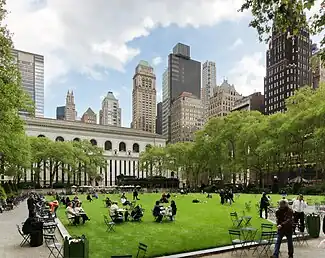 |
between 5th and 6th Aves, between W 40th and W 42nd Sts | 12.0 | 2017 | [30] |
| Prospect Park |  |
between 8th, Flatbush, Ocean, Parkside Aves, and Prospect Pk SW (Brooklyn) | 10.0 | 2017 | [31] |
| South Street Seaport | .jpg.webp) |
South St and Fulton St | 9.0 | 2014 | [28] |
| High Line | 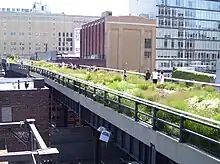 |
west of 10th Ave between Gansevoort and W 34th Sts | 7.6 | 2015 | [32] |
| Coney Island (including amusement parks and boardwalk) | .jpg.webp) |
southern shore of Brooklyn | 7.4 | 2017 | [33] |
| National September 11 Memorial | 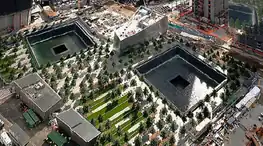 |
between West, Vesey, Greenwich, and Liberty Sts | 6.8 | 2017 | [34] |
| Metropolitan Museum of Art | 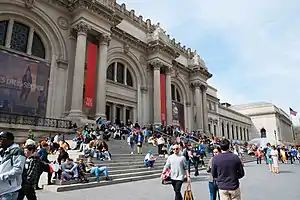 |
5th Ave and E 82nd St | 7.0 | 2019 | [28] |
| Rockaway Beach | 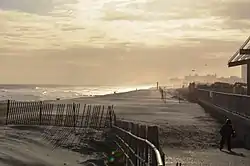 |
Rockaway, Queens | 5.5 | 2017 | [33] |
| American Museum of Natural History | 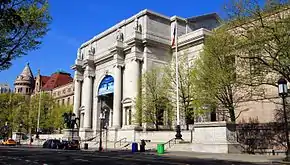 |
between Columbus Ave, Central Park W, and W 77th and W 81st Sts | 5.0 | 2018 | [35] |
| Statue of Liberty and Ellis Island |  |
Statue of Liberty National Monument (off the coast of Manhattan) | 4.5 | 2016 | [36] |
| Empire State Building | .jpg.webp) |
5th Ave and W 34th St | 4.0 | 2015 | [37] |
| National September 11 Museum | 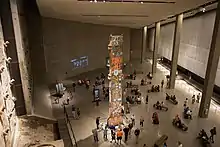 |
Greenwich St and Cortlandt Way | 3.1 | 2017 | [34] |
| Museum of Modern Art | 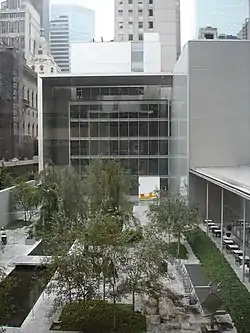 |
11 W 53rd St | 2.8 | 2016 | [38] |
| One World Trade Center |  |
West St and Vesey St | 2.3 | 2015 | [37] |
| Bronx Zoo | 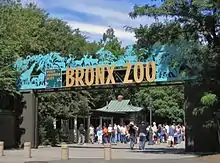 |
2300 Southern Boulevard, Bronx | 2.15 | 2009 | [39] |
Notes:
- Many of these counts also include residents and workers as well. In addition, the actual visitor counts may be greatly inflated since a single person may be counted multiple times if they visited the attraction more than once a year. For this reason, modes of transport such as the Staten Island Ferry and Brooklyn Bridge are excluded, as are neighborhoods such as Greenwich Village, Harlem, and the Financial District.
- Brooklyn Bridge Park, which saw 4.62 million visitors in summer 2016, is excluded because annual statistics are not available.[31] However, Coney Island and Rockaway Beach are included since they are seasonal destinations.
- The Battery, the port of departure for Statue of Liberty and Ellis Island tourist ferries, is excluded.
- Sports stadiums are also excluded since annual attendance may fluctuate greatly from year to year.
See also
References
- Edward Robb Ellis (21 December 2004). The Epic of New York City: A Narrative History. Basic Books. p. 593. ISBN 9780786714360. Retrieved December 16, 2022.
- Rachel Sugar (December 19, 2016). "More tourists visited NYC in 2016 than ever before". Vox Media. Retrieved April 24, 2018.
- "NYC travel and tourism report 2018". NYC & Company.
- "Mayor Giuliani Announces Amount of Parkland in New York City has Passed 28000 Acre Mark". New York City Mayor's Office. February 3, 1999. Retrieved 2007-06-06.
- "Beaches". New York City Department of Parks & Recreation. Retrieved 2007-06-06.
- "City Park Facts". The Trust for Public Land, Center for City Park Excellence. June 2006. Retrieved 2006-07-19.
- "General Information". Prospect Park Alliance. Archived from the original on 2007-06-10. Retrieved 2007-06-06.
- "NYC Travel & Tourism Outlook" (PDF). NYC & Company/STR. March 2022. Retrieved August 12, 2022.
- NYC & Company. "NYC Statistics". Retrieved 2006-08-03.
- "NYC Hotel Industry in a 'Depression,' Room Revenue Down 60%, Report Says" – WNBC, July 1, 2021
- McGeehan, Patrick (2017-11-19). "New York City Expects More Tourists, but Fewer International Visitors". The New York Times. ISSN 0362-4331. Retrieved 2018-02-21.
- New York Daily News, Sept 17 2003 Patriotic boost for city tourism
- "Business: NYC". a858-elpaca.nyc.gov.
- Potenza, Theresa (2016-05-08). "Take our test: Are you smarter than an NYC tour guide?". New York Post. Retrieved 2019-11-19.
- "Licensed tour guides have to pass extensive test of NYC knowledge". amNewYork. December 20, 2017. Retrieved November 19, 2019.
- Hu, Lydia (November 16, 2018). "Do You Have What it Takes to Be an NYC Tour Guide?". Spectrum News NY1 | New York City. Retrieved November 19, 2019.
- "TRAVEL ADVISORY; New Yorkers As 'Greeters'". The New York Times. 1992-05-31. ISSN 0362-4331. Retrieved 2019-11-19.
- Allen, Anne Wallace (August 1, 2010). "Volunteers give free tours in cities around the world". USA Today.
- NYC & Company. "NYC & Company Offices Worldwide". Retrieved 2007-03-25.
- "Places To Visit In New York City". Pinterest Places To Visit In New York City. Archived from the original on February 15, 2015. Retrieved February 14, 2015.
- "Gesso | Punks + Poets". Gesso. Retrieved 2021-07-12.
- "Gesso | Immersive City + Museum Guides". Gesso. Retrieved 2021-07-12.
- Bleyer, Jennifer (May 14, 2006). "Kebabs on the Night Shift". The New York Times. Retrieved 2006-07-19.
- Collins, Glenn (November 3, 2005). "Michelin Takes on the City, Giving Some a Bad Taste". The New York Times. Retrieved 2006-07-19.
- Courtney Hollands, Kara Baskin, and Christie Matheson. "Break Loose". Boston Globe. 28 March 2010. http://www.boston.com/bostonglobe/magazine/articles/2010/03/28/break_loose/?page=3
- New York Food Tours, http://foodtoursofny.com/index.html; Queens Food Tours, http://queensfoodtours.com, Rum and Blackbird Tasting Tours, http://www.rumandblackbird.com/
- Van Buren, Alex (January 27, 2016). "12 Secrets of New York's Central Park". Smithsonian. Retrieved May 18, 2019.
- Polland, Jennifer. "The 50 Most Visited Tourist Attractions In The World [INFOGRAPHIC]". Business Insider. Retrieved 2019-07-08.
- "The best Manhattan attractions". Time Out New York. Retrieved 2019-07-08.
- "Archived copy" (PDF). Archived from the original (PDF) on 2018-03-16. Retrieved 2019-07-09.
{{cite web}}: CS1 maint: archived copy as title (link) - "Millions (and millions) of visitors poured into Brooklyn Bridge Park this summer". Brooklyn Eagle. 2017-12-26. Retrieved 2019-07-08.
- "Friends of the High Line founder raises concern about park's success". Archpaper.com. 2017-02-24. Retrieved 2019-07-08.
- "City beaches saw best numbers in three years: Parks". am New York. 22 October 2018. Retrieved 2019-07-09.
- "2017 Annual Report | National September 11 Memorial & Museum". 2017 Annual Report | National September 11 Memorial & Museum. Retrieved 2019-07-08.
- "American Museum of Natural History to break ground on new center". am New York. 10 June 2019. Retrieved 2019-07-08.
- "Park Statistics - Statue Of Liberty National Monument (U.S. National Park Service)". www.nps.gov. Retrieved 2019-07-08.
- Bagli, Charles V. (2016-05-27). "3.3 Million Were Expected at Trade Center Attraction; a Million Haven't Shown Up". The New York Times. ISSN 0362-4331. Retrieved 2019-07-09.
- "Visitor figures 2016: Christo helps 1.2 million people to walk on water". theartnewspaper.com. Archived from the original on December 23, 2017. Retrieved December 22, 2017.
- JACOB E. OSTERHOUT (November 13, 2009). "In honor of its birthday, 110 things to know about the Bronx Zoo". NY Daily News.